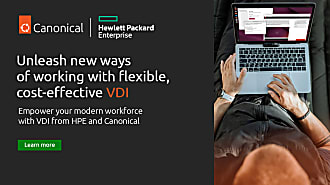Canonical
on 19 April 2012
Ubuntu 12.04 LTS Server to be certified, supported on HP ProLiant systems
Companies to target hyperscale, cloud and big data customers
Canonical today announced the imminent certification and support of Ubuntu 12.04 LTS, a leading Linux-based server operating system, on select HP ProLiant servers. Ubuntu drivers and management software delivered by HP will be included as part of HP ProLiant hardware warranty support. This will include the latest HP ProLiant Generation 8 (Gen8) servers.
Ubuntu will be added to the HP ProLiant Certification and Support Matrices on HP.com which is the source that outlines what operating systems receive ProLiant hardware warranty support from HP. From the launch of Ubuntu 12.04 LTS Server on the 26th April 2012, customers requiring Ubuntu hardware warranty support on HP ProLiant servers will be able to receive it from HP. Additionally, Canonical and HP will work to identify joint opportunities as well as pre-and post-sales deployments.
Ubuntu provides the infrastructure necessary for the distributed applications that are changing the way businesses manage big data, hyperscale and cloud computing. Customers using Ubuntu on HP ProLiant servers can expect to receive the scalability, flexibility and availability required by the most demanding workloads.
“Customers running Linux want choice when deploying an operating system that can support their demanding workloads,” said Scott Farrand, vice president, Infrastructure Software and Blades, HP. “As an emerging Linux distribution, Ubuntu on HP ProLiant servers offers the scalability and flexibility to manage big data, cloud and hyperscale applications.”
Jane Silber, CEO of Canonical commented, “This validates our decision to focus on the technologies that will underpin the next generation of datacentres. More importantly it gives a vast number of users the ability to deploy these technologies with the support and backing of the largest computer manufacturer in the world. I can't wait to see where this takes us next.”
The alliance will focus on qualifying Ubuntu onto select HP ProLiant models as well as establishing the process for qualifying new models. Beginning with the Ubuntu 12.04 LTS release, HP will work with Ubuntu to certify HP ProLiant server models shortly after launch. The collaboration is designed to meet the needs of hyperscale customers and to keep Canonical and HP actively engaged in the emerging category of servers based on ARM chip designs.



